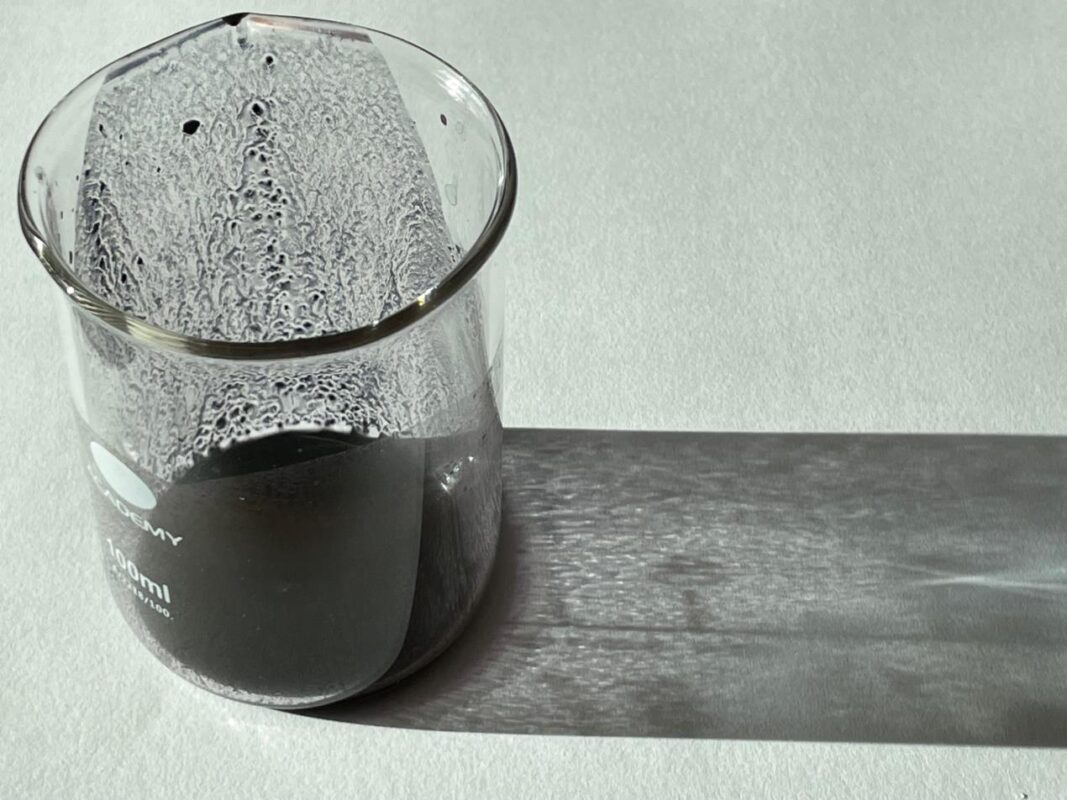Finisterre x Arts University Plymouth – Dye mapping for sustainability

Lecturer Charlotte Warren partners with pioneering clothing manufacturer Finisterre to promote sustainable textile dyeing
Charlotte Warren, a Lecturer in BA (Hons) Textile Design and researcher from Arts University Plymouth, has partnered with pioneering clothing manufacturer Finisterre to support dye mapping within their supply chain.
In 2018, Finisterre was the first outdoor clothing company in the UK to become B Corp certified, verifying that the company meets the highest standards of social and environmental performance, transparency, and accountability, taking into account the impacts of Finisterre’s decisions on society and the environment. In 2021 Finisterre was recertified by B Corp with an improved score, based on its embedded initiatives to prioritise the environment.
In 2022 Finisterre partnered with Charlotte Warren, on a project funded by Research England’s Knowledge Exchange, designed to help universities to collaborate with people and organisations outside of academia to share skills and knowledge in a way that benefits society and the economy. The project aims to assess how efficient and responsible the Finisterre dyeing system currently is, arming them with the knowledge to make more informed decisions in relation to textile dyes, ultimately leading to more sustainable and conscientious dyeing solutions.
Roughly one million tonnes of dye are produced annually throughout the world and the textile dyeing industry consumes around two thirds of this (Anjaneyulu, Sreedhara Chary and Samuel Suman Raj, 2005). Despite stricter regulations over recent years on the discharge of waste dyes into mainstream water supplies, the level of dye waste in circulation is still a big problem. Once in the natural environment the chemical dyes can degrade causing harmful effects to the surrounding landscape, fauna and flora.
Charlotte said: “I’m thrilled to be working with Finisterre on such an important project. I began my career in textiles as a commercial designer, which involves working with textile dyes. Living in Devon and doing a lot of sea swimming, it became apparent to me that so much of what we create enters the water at one point or another and I wanted to look more closely at what impact our design decisions were having on the natural environment. At the initial stages of design it is more common to think about fashion trends and aesthetics rather than the environmental impact of our design decisions. That’s something that I want to help manufacturers to address.”
“When we talk about the impact of the textile industry on water quality, both within the UK and around the world, it’s worth keeping in mind that most manufacturers are diligent in adhering to the regulations that have been legislated for the country that they’re working in. Unfortunately, you’re currently allowed to discharge tons of dye waste into waterways in England on a daily basis, and we have some of the world’s strictest regulations, so it’s vital that more work is done to help designers and manufacturers make more informed choices in future.”
Degrading water quality within the UK has generated an increasing number of headlines in recent years and is fastly gaining momentum as a political issue of sustainability that is being discussed widely at a national level. A House of Commons Committee report in 2022 stated that only 14% of UK rivers had a “good” ecological status and no river in England was free from chemical contamination, with agricultural runoff and the release of untreated sewage acting as the leading causes of river pollution. It is important our students are equipped with the knowledge to tackle real life environmental problems related to their area of specialism head on.
“Finisterre is a manufacturer that already has sustainability embedded in their ethos and working methods,” Charlotte said, “so we’re treating this dye mapping project together as an opportunity to fill knowledge gaps and further improve their processes. Ultimately I hope to create a novel tool in the form of a chart that manufacturers can use during the concept and design stage, making it easier and more intuitive to know in advance what relative impact different types and colours of dye will have on the environment, so that this can be taken into consideration much earlier in the cycle.”
Charlotte is being assisted on the project by Arts University Plymouth MA Textile Design student Zowie Wyatt, working as a Research Assistant.
Waste effluent created by chemical dye
In addition to Charlotte’s research with Finisterre to minimise the impact of dyes on the ocean and waterways, lecturers and technicians from Arts University Plymouth’s BA (Hons) Textile Design course have also been working with the National Trust to establish a new plant garden for natural dye. Based on the use of heritage-inspired plants, the new garden will be used to teach students at the Arts University about alternative methods to the use of synthetic dyes, training in ways to work with dyes that are more sustainable and less damaging to the natural environment.
Through this research, Arts University Plymouth BA (Hons) Textile Design and MA Textile Design students gain invaluable experience in working with sustainable processes and enter the textile industry equipped with valuable knowledge aligned with businesses seeking to be better stewards of the planet. Graduates from these courses go on to become accomplished and inspirational textile and surface designers for fashion, interiors, products and craft applications as well as textile buyers, and stylists.
This dye mapping project is an Arts University Plymouth Knowledge Exchange activity supported by Research England’s Knowledge Exchange Funding for Smaller Providers.











Responses